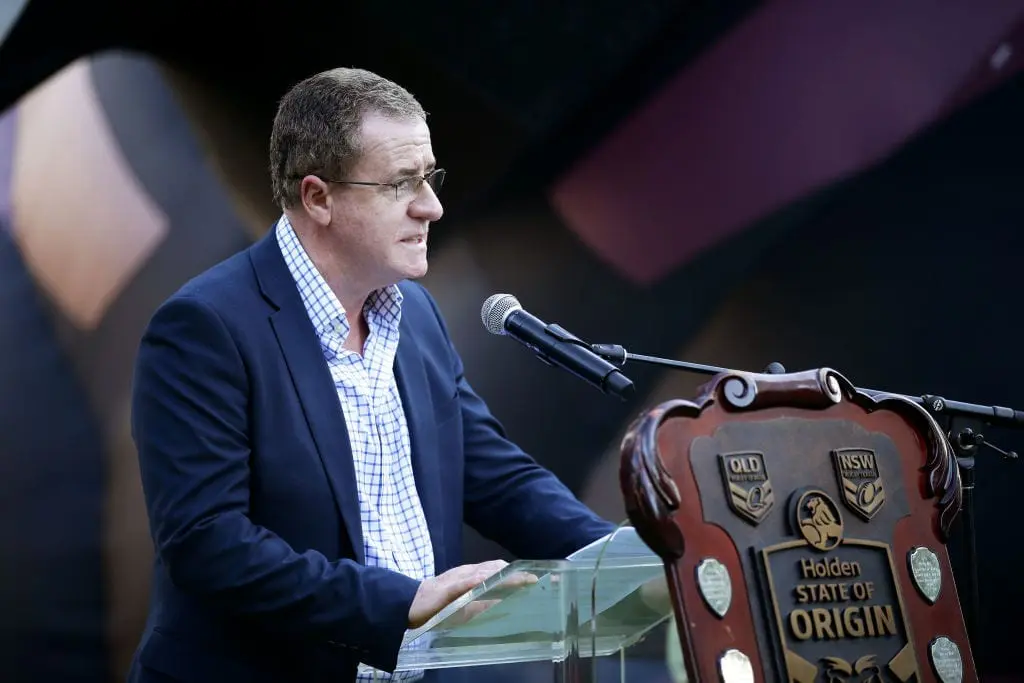The NRL have confirmed Brisbane Broncos fullback Reece Walsh should have been penalised for a shoulder charge during Thursday night's game against the Melbourne Storm.
The first half incident, which prevented a try to Melbourne centre Justin Olam, and the Storm from adding to a 6-0 lead, was cleared at the time by referee Todd Smith and officials in the NRL bunker.
Olam lost the ball and was forced into touch as a result of the contact, leading to a 20-metre restart and seven-tackle set for the Broncos, who would score a penalty try at the other end of the field in the following minute.
Walsh has since been handed a Grade 1 charge by the NRL's match review committee over the incident and will escape with a fine, but Annesley said he should have been penalised for the tackle on field.
"You can see that there is no particular action to wrap the arms at all. It's effectively shoulder to shoulder contact here which causes the ball to come free," Annesley said during Monday's footy briefing at NRL HQ to wrap up Round 11.
"From the back angle, you can see that the left arm is by his side, he comes across with shoulder to shoulder contact [and that forces Olam] touch in goal.
"I think it's pretty clear exactly what happened. The question is what should have taken place from the officials on the field, and to answer what else is he supposed to do if he is trying to defend a try in that situation.
"In our view, having reviewd this since Thursday night, this was a shoulder charge, there should have been action taken for it on the field. It was cleary reviewd by the match review committee having all the time in the world, and there was a Grade 1 charge laid for this. There was no on-field action taken and we think that was an error by the match officals."
Despite the clear penalty, Annesley said the NRL had arrived at the view that there was no certainy of a try, and therefore it wasn't a penalty try, but said Walsh had other options than committing a shoulder charge to stop the try.
"In our view, it's certainly not a penalty try. A penalty try generally results from a situation where you have a player usually chasing the ball who is in front of another player and that player gets brought down, and in the view of the bunker or the referee, a try would have been scored if not for the illegal interference of the other player," Annesley said.

"This isn't an illegal interference as such, it's an illegal tackle and illegal contact, but if I come back to what else is he supposed to do in this situation, clearly the answer is make a legitimate tackle. There are legitimate tackles like this in every game where players wrap their arms coming in from the side and they are still able to exert momentum onto the ball carrier that would potentially arrive at the same outcome.
"You just can't come in using only your shoulder to effectively charge into another player, in this case the ball carrier. I'm not suggesting it had to be a legs tackle, I'm not suggesting a different type of tackle would have prevented the try, but there are other options that are not considered to be illegal tackles that could have been taken.
"We don't let players tackle around the head to stop a try, we don't let players commit any other form of illegal play to stop a try. We don't allow them to trip players, we don't allow them to take a flying kick at somebody, and the same applies to a shoulder charge. Whether a try would have been scored or not is immeterial, you can't lose an illegal tactic to try and stop a try."
Annesley also said a sin bin could have been warranted following the tackle from Walsh, and confirmed that the referees and bunker officials on the day simply missed the shoulder charge from Walsh, despite social media and commentators being whipped into a frenzy by the tackle.
"We think that a penalty most certainly should have been awarded, and then the referee would have been able to decide if he wanted to use the sin bin or not, but no action was the wrong answer," Annesley said.
"My understanding is that it [the shoulder charge] was cleared by the bunker. I'm the first to acknowledge there can be a fine line between whether a player attempts to wrap or not. My view on looking at this from all angles is that there was not any attempt to wrap, it was an attempt to bump the player.
"You can for example do exactly what he did right up until the very last moment. He could have got there and pushed him. If he just gives him a shove and pushes him into touch, that's perfectly legitimate."
Walsh being handed a Grade 1 charge means he will be able to play for the Broncos next week against the Penrith Panthers in what will be final audition for the fullback to earn a Queensland Maroons' jersey.
The Broncos will also be looking to get back into the winners' circle after ultimately coming up short against the Storm on Friday.






















